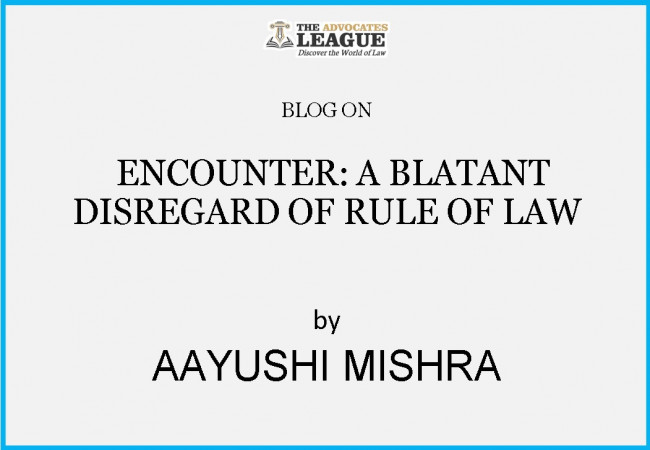ENCOUNTER: A BLATANT DISREGARD OF RULE OF LAW

We are in Holy Orders and recognize
only one law, the law of Dharma, the law of life-embracing, sustaining and
unifying all activities of life”.
: Sankaracharya
Rule of law or dharma is the supreme
principle for the governance of the state. It paves the way not only in the
direction of better functioning of any government but also in restoring faith
and balance in the supremacy of law. Rule of law is the key to all the legal
and ethical regulations for any enlightened civilized society. It lays the very
basic foundation of the legal system by describing it as legal rules as legally
regulated. The essence of this principle is that no one, not even the king is
above the law. India, the oldest
civilization, largest democracy, and a staunch believer of equality, with
morally upright people sometimes fails to restore its loyalty to basic
principles of law and humanity. The recent surge in the number of encounter
cases shows the failure of faith in the constitution and legal system of our
country. Encounter is a shield provided to officers for rarest situations that
are often misapplied. This apparently reflects the actions of those in
authority creating a mockery of democracy and the judicial system of India.
Indian after gaining independence
was constituted on the very idea of equality and democracy. Different articles
of the constitution provide such rights; Article 14 guarantees the right to
equality before the law and equal protection of the law. Article 21 guarantees
the right to be heard. Also, Art 15, 16, 23 further strengthened the idea of
equality by the incorporation of protective discrimination as a means of
ensuring equality amongst equals. Nevertheless, no country can function without
state machinery and it is of absolute significance to provide some privilege to
this machinery for safeguarding the very concept of nation. Encounter is one
such exemption given to machinery against criminals. However, this blanket of
encounters with these machines is often used by them arbitrarily. Any act
arbitrary and such heinous is a blatant disregard of the overall concept of
rule of law and the idea of Independence. In other words, it can be said that
there lies no difference between a colonial state and an independent state. At
a place, we as a country act on principles of
“ presumption of innocence until proven guilty” and provide legal
assistance to terrorists, to preserve their right to be heard. Pathetically
another side of the coin uncovers an entirely bizarre image. Not only
encounters are a serious threat but also fake encounters. Fake encounters are
extrajudicial killing or it can be completely regarded as murder, is a purely
malicious act by the state machinery. Some of the laws protecting such
machinery are: The law relating to the right of private defense is contained in
Section 96 to 106 of the Indian Penal Code (IPC), 1860.
The officers also take the plea of
Exception 3 of Section 100 of IPC, which has been given to protect a public
servant, and he who exceeds the power given to him by law, causes death in good
faith, necessary for the discharge of duty. However, this exception clause will
not apply if the act is illegal or against public policy, or exceeds the power
given to him by law.
Clause 3 of Section 300 of IPC,
comes into light which provides that if any public servant/ any person authorized
by a public servant exceeds their power to causing death while acting for the
advancement of justice and which they believe as lawful and mandatory for
discharging his duty without any ill intention, then they will not be liable
for murder.
Section 46(2) of the Code of
Criminal Procedure provides a wider power to the person making an arrest. It
provides that if any person tries to escape arrest, the person making the
arrest has the power to use all necessary force required for making the arrest.
Hiding under these veils the authorities have taken advantage from time to
time.
Encounter history is untraceable,
its presence can be found in all the periods with different locations. However,
prominent ones are the 1970’s Naxalites encounters, the 1980’s Punjab, and the
Assam insurgency. When bullet for bullet policy prevailed. Operations blue
star, operation black thunder, etc were carried out. As a country, we have
questionable cases of encounter killing, from Pilibhit encounter case to
Veerappan case of Tamil Nadu to Bhagalpur blinding case, to Ishrat Jahan case.
However, presently there has been a surge in encounter cases in the country.
Data presented by NHRC shows around 1000 cases of fake encounters during
2000-2017.
Analysis of the reports and news
imposes concern and threat equally to this progressive society. Also, the suspicion arises that are we even a
country with the ideals and principles its foundations were laid and cemented?
The encounter can be regarded as
cold-blooded murder which should neither be praised nor encouraged. Enriching
cultural civilization and education do not favor eye for an eye. We as a
society of the 21st century and advancing ideas cannot rely on the
barbaric traditions of humans. Moreover, we cannot afford to set a new low in disdain
for constitutional values. India as a
developing nation cannot let its law and order fall miserably. Therefore, there
should be the inculcation of the ethical and legal standards among the people
of this country.
